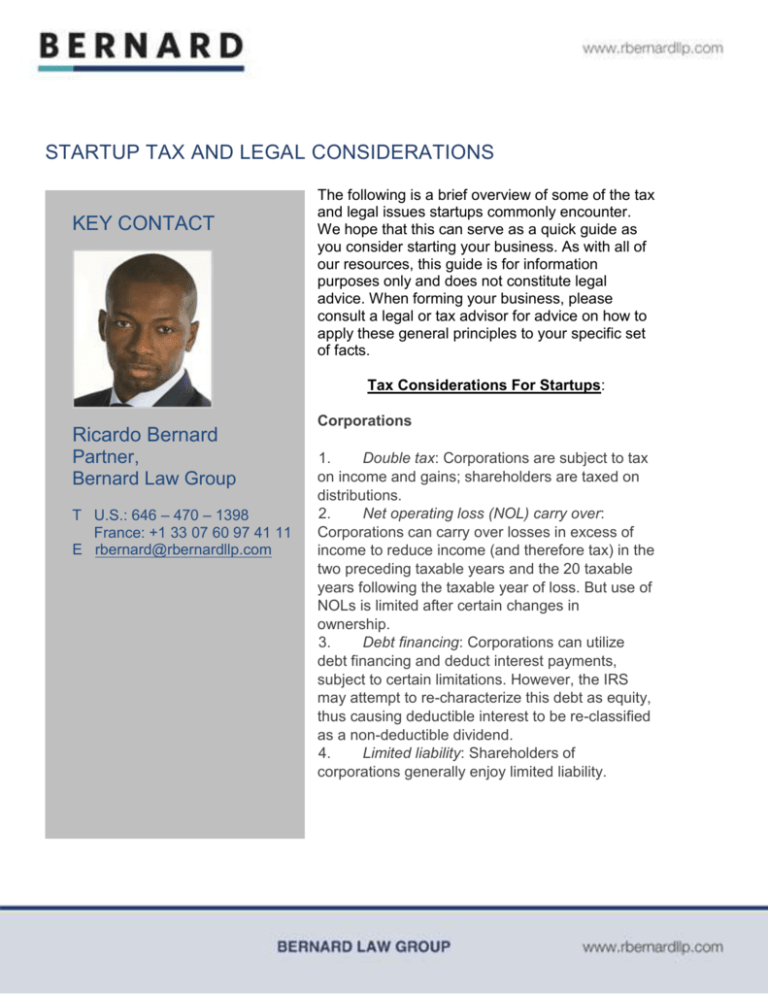Startup Tax & Legal Considerations
advertisement

STARTUP TAX AND LEGAL CONSIDERATIONS KEY CONTACT The following is a brief overview of some of the tax and legal issues startups commonly encounter. We hope that this can serve as a quick guide as you consider starting your business. As with all of our resources, this guide is for information purposes only and does not constitute legal advice. When forming your business, please consult a legal or tax advisor for advice on how to apply these general principles to your specific set of facts. Tax Considerations For Startups: Ricardo Bernard Partner, Bernard Law Group T U.S.: 646 – 470 – 1398 France: +1 33 07 60 97 41 11 E rbernard@rbernardllp.com Corporations 1. Double tax: Corporations are subject to tax on income and gains; shareholders are taxed on distributions. 2. Net operating loss (NOL) carry over: Corporations can carry over losses in excess of income to reduce income (and therefore tax) in the two preceding taxable years and the 20 taxable years following the taxable year of loss. But use of NOLs is limited after certain changes in ownership. 3. Debt financing: Corporations can utilize debt financing and deduct interest payments, subject to certain limitations. However, the IRS may attempt to re-characterize this debt as equity, thus causing deductible interest to be re-classified as a non-deductible dividend. 4. Limited liability: Shareholders of corporations generally enjoy limited liability. LLCs 1. “Flow-through” tax treatment: Members, not the entity itself, are subject to tax, so only one level of tax imposed. 2. Flexibility: Allows for more flexibility in how allocations and distributions can be apportioned among owners. 3. Complexity: Overlapping layers of anti-tax shelter statutes and regulations make LLC operating agreements very dense reading. 4. Limited liability: Members enjoy limited liability. S Corporations 1. Shareholder limitations: S Corporations are limited to 100 shareholders (natural persons and certain trusts) and only one class of stock. Shareholders cannot be non-resident aliens. 2. Election required within specified time: all shareholders must consent. 3. Flow-through tax treatment: Treated like LLCs – no tax at the corporation level, and corporation’s income, credits, gains and losses flow through to shareholders. 4. Shareholder’s “flow-through” loss deductions: Shareholder loss deductions are limited to the aggregate tax basis of (i) the shareholder’s S Corp. stock and (ii) the debt of the S Corp. to shareholder. 5. Borrowing: Stock basis is not increased by corporate borrowing, even if the shareholder guarantees debt; to increase basis and take losses, shareholder must borrow directly and contribute cash (or other property). 6. Property distributions: If the S Corp. has earnings and profits from when it was a C Corp., property distributions will generate gain recognition. 7. No special allocations: All income and loss is shared in proportion to stock ownership. 8. Venture capital termination: Venture capital investment usually terminates S Corp. status because venture capital preferred stock violates rules against multiple classes of stock and VCs are disqualified shareholders. Taxable Year Most taxpayers use the calendar year, but a taxable year other than the calendar year may be desirable depending on the taxpayer’s business cycle. There are different restrictions in place for each type of entity. Method of Accounting The entity must adopt a method of accounting that accurately reflects income. There are several methods available to the taxpayer. Contributing Property 1. General rule: Exchange of old property for new property (e.g., a patent is contributed in exchange for stock in the newly formed entity (Newco)) is taxable. 2. Amount of income (loss): The difference between the tax basis of the property and fair market value of Newco stock received. 3. Character of income (loss): Treated as ordinary or capital – short or long-term – depending on the character and holding period of the property surrendered. 4. Incorporation transfers: Corporate founders (and other contributors) recognize no gain or loss when they transfer property to Newco in exchange for its stock if (i) founders receive only Newco stock; (ii) anything received in addition to stock is taxed as “boot” and gain may be recognized to the extent of boot received; and (iii) founders, immediately after transfer, are members of a group “in control” of Newco, which is defined as 80% of the combined voting power of all classes of stock entitled to vote and 80% of each nonvoting class. If these requirements are met, then the transfer of property results in non-recognition treatment. Cheap Stock Issues 1. Lowest risk for founders of income recognition is receipt of stock for services before any outside investors are in the wings. 2. Common stock is generally valued at a discount from preferred stock; proper amount of discount is open to question, and third-party 409A1 valuations are generally advised after any preferred stock financing. 3. Lower value means receipt (or vesting) of stock results in less risk of income recognition. Important Regulatory Matters: State Foreign Qualifications Many businesses are located in a state that is different than the state of formation. For instance, a business that is organized under Delaware law may have a place of business in Massachusetts. In such cases, the Delaware entity may be deemed to be transacting business in Massachusetts and would therefor be required to qualify as a foreign entity in Massachusetts. The types of activity requiring registration as a foreign entity and the consequences of failing to do so vary from state to state. Each state’s office of the Secretary of State and the third-party service providers discussed below can be helpful with state foreign qualification questions. Annual Reports and Franchise Tax Filings Although the specific requirements vary by state, the state of formation and any states where an entity is registered as a foreign entity likely require an annual report and payment of franchise taxes and fees each year an entity exists. The franchise tax and fee information for the State of Delaware may be found here and, like foreign qualifications, each state’s office of the Secretary of State and the third-party service providers discussed below can be helpful. 1 Section 409A is the section of the Internal Revenue Code dealing with non-qualified deferred compensation. Business Licenses Most city, county and state governments require business owners to obtain business licenses and permits. These licenses and permits grant business owners the privilege of legally operating a business within the particular jurisdiction. Fees, requirements and procedures vary by jurisdiction, and failure to have the proper licenses and permits may prevent a business from opening or operating and could result in fines. State and county government offices can be helpful in determining what licenses and permits are required and how such license and permits can be obtained. Employee Identification Number (EIN) Corporations, LLCs and S-Corps are required to obtain federal Employer Identification Numbers. An EIN may be obtained on the Internal Revenue Service’s website. Checklists for Forming Entities C Corp Checklist: File Certificate of Incorporation with the Delaware Secretary of State 1. Confirm availability of the name chosen for your company. 2. Contact and retain a Registered Agent. 3. Review carefully your Certificate of Incorporation to ensure it contains all the required information. 4. Cause the Incorporator to sign and date the Certificate of Incorporation. 5. File the signed and dated Certificate of Incorporation with the Delaware Secretary of State. Filing may be accomplished directly with the Delaware Secretary of State. 6. You will receive evidence of filing and certification of formation once your Certificate of Incorporation has been accepted by the Delaware Secretary of State’s office. Complete, Sign and Date Remaining Formation Documents (other than Stock Certificates) 7. Review carefully the remaining formation documents and confirm the information (including full legal names, correct addresses, share amounts, etc) is correct. 8. Fill in all required dates and collect all signatures for each of these formation documents (other than the Stock Certificates which are addressed below). Issue Shares of Common Stock to Founders 9. Obtain from the founders executed copies of their respective Subscription Letters and, to the extent applicable, Founder Stock Restriction Agreements. 10. Collect the applicable purchase price for the shares from each founder (each founder’s aggregate purchase price is reflected in his or her respective Subscription Letter) and retain evidence of payment for the Company’s records. 11. Print the first and second page of each Stock Certificate on both sides of a single sheet of paper to ensure that the second page (the “reverse side”) containing the applicable restrictive legends does not get detached from the front page of the certificate. You may wish to print the Stock Certificates on water-marked paper. 12. Each Stock Certificate should be signed and dated by the President and the Secretary of the Company. 13. Deliver vs. Retain Stock Certificates: If a founder is not entering into a Founder Stock Restriction Agreement and his or her shares are not subject to vesting, the Stock Certificate can be delivered to the founder. Be sure to retain a photocopy of the Stock Certificate (front and back) for the Company’s records. If, however, a founder is entering into a Founder Stock Restriction Agreement and his or her shares are subject to vesting, then the Company should retain such founder’s Stock Certificate to be held by the Company in escrow pursuant to Section 8 of the Founder Stock Restriction Agreement. 14. Any founder who is entering into a Founder Stock Restriction Agreement and subjecting his or her shares to vesting, must decide whether or not to file an 83(b) election with the Internal Revenue Service (IRS). Such decision should be made in consultation with a tax advisor. To be effective, an 83(b) election must be filed with the IRS within 30 days of purchasing the shares. See the 83(b) election memorandum posted on the Founder’s Workbench for further information. Post-Formation 15. File to obtain a Federal Employer Identification Number, which is required of all corporations. Instructions regarding the filing of Form SS-4 are available on the IRS website. Filing can be completed online. 16. File to obtain applicable state level identification numbers and other state level registrations, including workers’ compensation filings, depending upon the state in which your company’s office is located. Visit your state employment and tax agency’s websites for further information. Securities Law Compliance 17. Federal and state securities laws may require governmental filings reflecting the issuance of stock to founders. Please consult your legal counsel regarding compliance. 18. Consider foreign state qualifications. Corporations must qualify in states (other than the one in which they are incorporated) if they transact business in that state. Using a registered agent service can help in facilitating this process. 19. Prepare a stock ledger (for example, using an excel spreadsheet) to record the issuance of each Stock Certificate (in order by certificate number (C-1)), including share amount, name of recipient and date of issuance. Record any subsequent transfers and cancellations. We are happy to provide a model stock ledger. 20. Set up and maintain the Company’s records, including a corporate minute book to hold important corporate documentation (including the Formation Documents). Single Member LLC Checklist: File Certificate of Formation with the Delaware Secretary of State 1. Confirm availability of the name chosen for your company (this can be done at no charge at the Delaware Secretary of State website). Similarly it is suggested that you check the name in any state in which you will be doing business. 2. Contact and retain a Registered Agent. 3. Review carefully the company’s Certificate of Formation. 4. Cause the Authorized Person to sign and date the Certificate of Formation. 5. File the signed and dated Certificate of Formation with the Delaware Secretary of State. You will receive evidence of filing and certification of formation once your Certificate of Formation has been accepted by the Delaware Secretary of State’s office. Post-Formation 1. Execute personally and obtain from all employees and consultants executed copies of the Confidentiality & Intellectual Property Assignment Agreement, to the extent applicable. 2. File to obtain a Federal Employer Identification Number. See the IRS website for instructions regarding the filing of Form SS-4. Filing can be completed online. 3. File to obtain applicable state level identification numbers and other state level registrations, including workers’ compensation filings, depending upon the state in which your company’s office is located. Visit your state employment and tax agencies’ websites for further information. 4. Securities law compliance. The federal and state securities laws may require governmental filings reflecting the issuance of an equity interest in the single member limited liability company to the founder. Please consult your legal counsel regarding compliance with these laws. 5. Consider foreign state qualifications. Limited liability companies may be required to qualify in states (other than the one in which they are formed) if they transact business in that state. 6. Set up and maintain the Company’s records, including a company minute book to hold important company documentation (including the Formation Documents). Multi-Member LLC Checklist: File Certificate of Formation with the Delaware Secretary of State 1. Confirm availability of the name chosen for your company (this can be done at no charge at the Delaware Secretary of State website). Similarly it is suggested that you check the name in any state in which you will be doing business. 2. Contact and retain the Registered Agent you selected when answering the Questionnaire. 3. Review carefully the Certificate of Formation generated from your completed Document Driver® Questionnaire and confirm the information. 4. Cause the Authorized Person to sign and date the Certificate of Formation. 5. File the signed and dated Certificate of Formation with the Delaware Secretary of State. Filing may be accomplished directly with the Delaware Secretary of State or through a registered agent service such as The Corporation Trust Company or Corporate Service Company. 6. You will receive evidence of filing and certification of formation once your Certificate of Formation has been accepted by the Delaware Secretary of State’s office. Complete, Sign and Date Remaining Formation Documents 7. Review carefully the remaining Formation Documents and confirm the information (including full legal names, correct addresses, unit amounts, etc.). 8. If the founder(s) are contributing material intellectual property, any other assets of value or if the founder(s) plan to contribute cash to the company, consult with the founder(s) tax, accounting and/or legal advisors regarding reflecting the value thereof prior to signing. 9. Fill in all required dates, collect all signatures and attach applicable exhibits for each of the Formation Documents. Issue Common Units to Founders 10. Obtain from the founder(s) executed copies of their respective Subscription Letters and, to the extent applicable, Founder’s Restricted Unit Agreements. 11. Obtain from the founder(s) executed copies of their respective Contribution and Assignment Agreements, to the extent applicable. 12. Collect the applicable cash contribution, if any, from each founder and retain evidence of the contribution for the Company’s records. 13. Any founder who is entering into a Founder’s Restricted Unit Agreement and subjecting his or her units to vesting, must decide whether or not to file an 83(b) election with the Internal Revenue Service (IRS). Such decision should be made in consultation with a tax advisor. To be effective, an 83(b) election must be filed with the IRS within 30 days of purchasing the units. See the 83(b) election memorandum posted on the Founder’s Workbench for further information. Any founder wishing to make an 83(b) election will need to consult with his or her legal and/or tax advisor for assistance in making this election and preparing the applicable tax form Post-Formation 14. Obtain from all founder(s), employees and consultants executed copies of the Confidentiality & Intellectual Property Assignment Agreement, to the extent applicable. 15. File to obtain a Federal Employer Identification Number. See the IRS website for instructions regarding the filing of Form SS-4. Filing can be completed online. 16. File to obtain applicable state level identification numbers and other state level registrations, including workers’ compensation filings, depending upon the state in which your company’s office is located. Visit your state employment and tax agencies’ websites for further information. 17. Securities law compliance. The federal and state securities laws may require governmental filings reflecting the issuance of units to founder(s). Please consult your legal counsel regarding compliance with these laws. 18. Consider foreign state qualifications. Limited liability companies may be required to qualify in states (other than the one in which they are formed) if they transact business in that state. 19. Set up and maintain the Company’s records, including a company minute book to hold important company documentation (including the Formation Documents). Note This outline is intended as a general overview of issues and considerations most relevant at the formation stage to typical startups. It is not intended to be a comprehensive discussion of all possible issues, considerations or concerns that would apply to any entity. Each entrepreneur should seek advice from their own tax or legal advisor regarding their particular circumstances and the tax and legal issues that might be most applicable to those circumstances.





